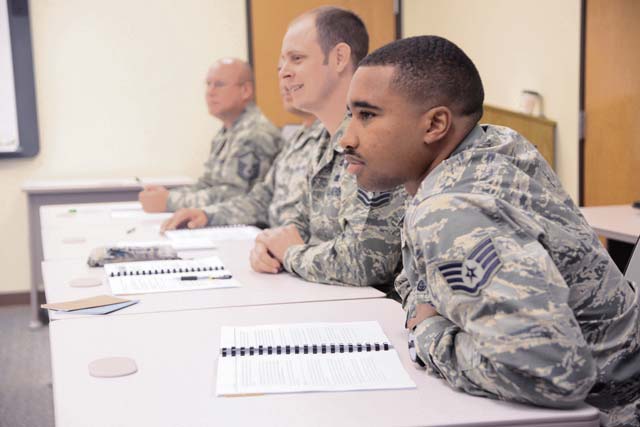
Staff Sgt. Mitchell Gorham, the First Term Airmen Course team lead at Joint Base San Antonio-Lackland, Texas, participates in a Career Assistance Advisor training course, Nov. 30, 2016, for the newly redesigned First Term Airmen Course. The course revamped FTAC from an in-processing focused program to a standard curriculum focused on developing Airmen.
JOINT BASE SAN ANTONIO-RANDOLPH, Texas — The Air Force has rolled out a new First Term Airmen Course dedicated to developing Airmen as next-generation leaders.
Airmen straight out of technical training will be taking the next step in their professional development when they attend the newly revamped FTAC at their assigned installation. The first installation to teach the course is Joint Base San Antonio-Lackland and all other installations will launch the new course by June 2017.
Headquarters Air Force Manpower, Personnel and Services, the Air Force Personnel Center, and the Profession of Arms Center of Excellence partnered to revitalize the FTAC, taking it from an in-processing focused program to a standard curriculum across the Air Force.
The courses were designed to provide a structured program to transition Airmen from a training environment to a mission-oriented environment. However, most are currently focused on base in-processing. The new course is a continuation of the training Airmen received at Basic Military Training and in technical training, building upon the skills they’ve already been introduced to.
A comprehensive review of FTAC was completed over the course of three months at the direction of the former Air Force chief of staff. The FTAC will now incorporate new lessons, known as “Airmanship 300,” as part of the continuum of training. Airmanship 100, commonly referred to as Airmen’s Week, is taught immediately following BMT, and Airmanship 200 is taught at technical training. The evolution of professional development includes Airmanship 300 in FTAC, with Airmanship 400 and 500 projected to be developed for the NCO and Senior NCO Professional Enhancement Courses. The courses are designed to ensure Airmen receive deliberate development at every milestone in their careers.
According to Senior Master Sgt. Tonya Joyce, the career field manager for career assistance advisors at AFPC, “We have an opportunity to create a continuum of professional development by introducing Airmanship into the courses delivered by our installation career assistance advisors.”
The new course includes modules from the existing Enhancing Human Capital course that many senior Air Force leaders are currently attending. These modules include discussions about trust, loyalty and commitment, in-group behavioral psychology and a team-building exercise. In addition to the EHC modules, Airmen will be introduced to scenarios as part of the “What Now Airman?” series and will be guided through discussions on how to approach the potential ethical dilemmas.
While the new curriculum is being introduced into the FTAC, many core topics currently taught will still be covered and the course length will remain at five duty days.
“We need to focus on developing the next generation of enlisted leaders,” said Chief Master Sgt. of the Air Force Kaleth O. Wright. “This starts in basic training, but has to be deliberate and continuous throughout an Airman’s career. These courses are the next step in the evolution of professional development for our enlisted force.”
To prepare CAAs for this new curriculum, PACE has added four days to the current six-day CAA training course. Additionally, four CAA training courses were held from January through March 2017 and an FTAC beta course covering the new material was held from December 2016 through May 2017.
For more information regarding Airmanship 300, please contact the Profession of Arms Center of Excellence at AETC.PACE.ProjectMgtWorkflow@us.af.mil.


